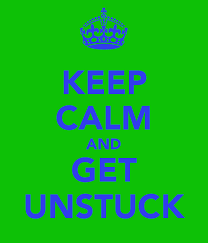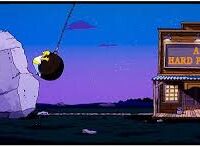It’s easy to get stuck, so why is it so hard to get unstuck ?
Lack of sensible strategies when faced by perceived difficulty is a recurring theme from the teachers with whom I work – about their students, obviously! Why, they ask, do my kids give up so readily? Why do they freeze when the going gets even slightly tough? Why does difficulty reduce otherwise confident students to nervous wrecks? Why do they expect learning to be easy? Why have they not got any coping strategies?
My flippant response along the lines of ‘I wonder why they are like that? Where have they been recently?’ rarely gets a laugh. Not that it stops me saying it!!
Problem-solving, and indeed learning in general, involves getting stuck and being puzzled. If a task does not puzzle us at all, then it is not a problem; it is just an exercise.
Moreover, getting stuck can happen for a range of reasons:
- The problem is beyond our background to solve
- The problem is not entirely clear
- It is not clear what knowledge to apply at a particular point
- The failure to identify what is blocking progress
The appropriate response depends on the reason for the stuckness. The challenge therefore, when stuck, is determining why one is stuck.
 So, when the child says ‘I can’t’ the teacher’s first task is to coach the student to identify and verbalise why they are stuck. A typical conversation could go:
So, when the child says ‘I can’t’ the teacher’s first task is to coach the student to identify and verbalise why they are stuck. A typical conversation could go:
- Student: I’m stuck
- Teacher: What is it that is holding you back?
- Student: It’s too hard (this is code for: ‘I can’t be bothered to give this more brain space, and anyway you know the answer. Why don’t you just tell me?’)
- Teacher: Can you be a bit more precise? What exactly is the stumbling block?
- Student: I can’t see any pattern here / I don’t understand what this means / I do not know what to do next / I am not sure I’m on the right track / I’ve forgotten what we did last time to solve this / and so on.
- Teacher: So what might you do about that?
- Student: I could check my results / I could look it up in a dictionary or the text book or the internet / I could list the possibilities and have a go at the most likely / I could check with others how they are tackling it / I could look back in my book.
Job done, stuckness resolved. In a perfect world, this conversation will not be conducted between teacher and student, rather it will happen between the student’s ears. The little voice that says ‘Why am I stuck? What do I already know? What do I need to know? How can I bridge the gap?’ should not, with practice, need an adult to guide it. Of course, students who hear their teacher saying this out loud when the teacher is problem solving, will be encouraged to employ the same strategy.


Comments are closed.